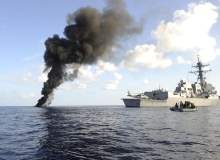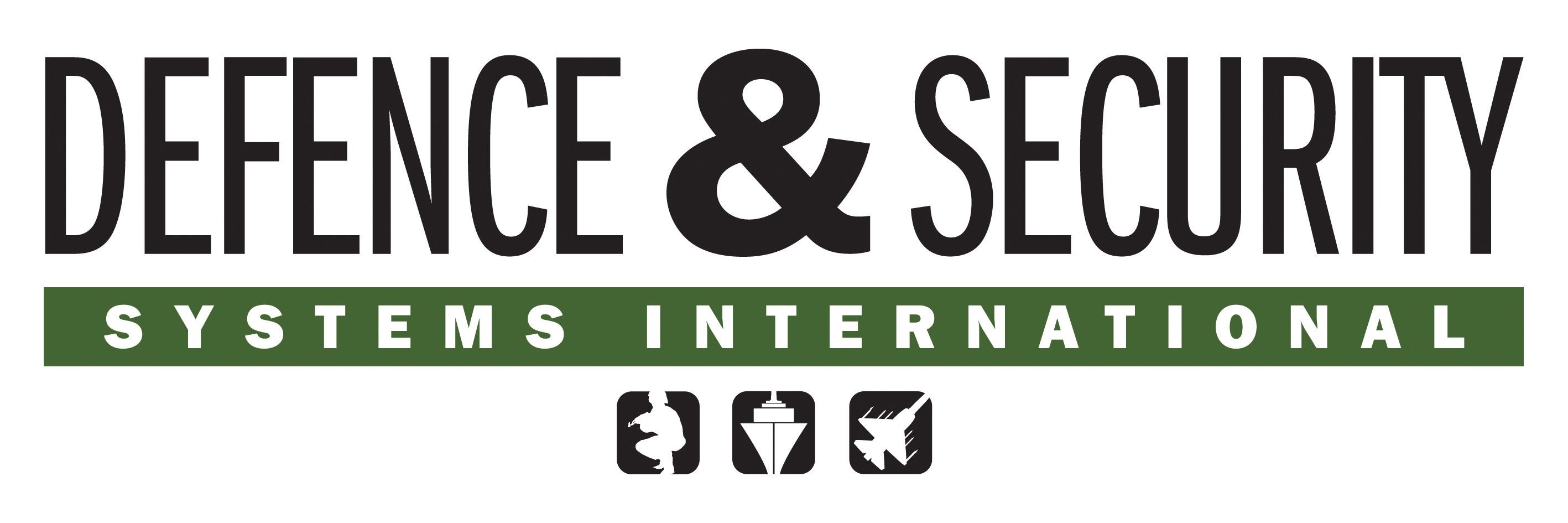
The growing threat of piracy
With piracy in international waters an increasingly major concern for the commercial shipping industry, anti-piracy measures have become an essential facet of global naval operations. Piracy represents both a physical threat to those onboard and a significant global commercial threat – as much as $12 billion a year, according to a 2010 report by American non-profit, One Earth Future Foundation.
International law states that piracy is a crime that can be committed only on or over international waters and other places beyond the territorial jurisdiction of any nation. Effectively, anti-piracy measures require concerted coordination between various nations.
"Navies can gain increased situational awareness through active surveillance by the vessels in the area, which can report suspicious vessels either to navies or to IMB’s 24-hour Piracy Reporting Centre (PRC) in Malaysia," said Cyrus Mody, ICC International Maritime Bureau (IMB) manager, London.
A US 5th Fleet spokesperson supported this view, saying technologies and capabilities used by counter-piracy units focus on the ability to achieve a coherent picture across the counter-piracy area of operations, thus enabling the efficient use of allocated resources to effectively disrupt and deter suspected pirates.
According to the IMB, while the number of piracy incidents grew by 5% last year to 430 attacks worldwide, it could drop this year, with 397 attacks reported to the IMB Piracy Reporting Centre (PRC) as of November 14.
Glen Forbes – co-founder of OCEANUSLive.org – reinforces Mody’s assertion, and said: "Best Management Practice (now at version 4, or BMP4) has been the foundation for the overall improvement in security measures on ships; combined with greater ship protection measures, planning and, crucially, the use of private security teams; this has made ship ‘hardening’ more reliable."
The Gulf of Aden – collaborative anti-piracy efforts
The majority of the world’s pirate attacks occur off the coast of Somalia, with the Gulf of Aden being the focal point for international anti-piracy operations. "As well as the higher military command organisations, EU, NATO and the Combined Maritime Forces, there are convoys conducted by India, Russia, China and other countries," Forbes said.
The 5th Fleet spokesperson highlights one of the major hurdles faced by anti-piracy forces: "The combined maritime force (CMF) counter-piracy task force (CTF 151) operates in an area encompassing 1.1 million square miles in the Gulf of Aden and Somali Basin. The size of this area compounds the difficulties of counter-piracy operations."
According to the 5th Fleet: "The US Navy works with coalition partners as part of combined maritime forces (CMF), using a range of strategies and technologies in counter-piracy operations. Fixed and rotary wing aircraft are equipped to operate by day or night with advanced electro-optics, secure voice communications and data links, and surveillance and imaging radars to conduct wide area reconnaissance."
Certainly, collaborative efforts in the region have started to show results. "The combined efforts of combined maritime forces (CMF), North Atlantic Treaty Organisation (NATO) and the European Union Naval Forces (EUNAVFOR), the nations deploying independently, International Maritime Agencies and the merchant industry have resulted in a significant increase in successful disruptions," the spokesperson said.
They go on to highlight the role the US Navy plays in the region, revealing: "US Naval Forces contribute to counter-piracy through US Navy warships, embarked security teams (EST) and visit, board, search and seizure (VBSS) teams, which routinely board suspicious vessels in and around the Gulf of Aden, Arabian Sea, Indian Ocean and the Red Sea.
"These approach and assist visits (AAVs) help to generate support and awareness amongst commercial vessels transiting the region of the coalition’s efforts to ensure a safe and secure maritime environment."
According to Forbes, cooperation and coordination are achieved fundamentally by the Shared Awareness and Deconfliction (SHADE) meetings held in Bahrain, providing a platform for industry and various multinational forces to exchange views and plans for the conduct of transits through the Gulf of Aden.
Forbes is well-respected within anti-piracy circles, having spent more than three decades in the British Royal Navy, including time as an instructor for the navy’s operational sea training organisation, as well as a posting as department head for the European Union (EU) NAVFOR communications team, co-creating two of the world’s most innovative means for fighting piracy: the Maritime Security Centre – Horn of Africa (MSCHOA), and Mercury systems.
MSCHOA and Mercury
"The award-winning MSCHOA initiative provides closer cooperation with the shipping industry," explained Forbes. "It monitors merchant vessel transits in the Gulf of Aden, provides alerts on piracy and the latest anti-piracy guidance to industry, and allows shipping companies and operators to register their movements through the region."
He goes on to highlight the key to the initiative: "The biggest impact was the provision in 2009 of Mercury, a ‘neutral’, Internet-based communications channel enabling all countries contributing to counter-piracy efforts to exchange immediate operational information."
Ships can now access information and/or cooperation from other on-duty ships, whatever the state of relations between the two countries, leading to closer ties between anti-piracy forces in the area. "Mercury is not constrained by national security concerns, it is aimed at the need to exchange operational imperative information."
The 5th Fleet spokesperson is also quick to commend MSCHOA: "If a ship’s master has already registered the ship with the MSCHOA prior to entering a high-risk area, as well notifying the UK Maritime Trade Operations Center (UKMTO) regularly once in the area, military forces operating nearby are better prepared to track and respond to vessels in distress."
New anti-piracy technology
"In terms of technology, surprisingly, there has not been much further development on a multinational scale," said Forbes. "Most military development remains in-house, behind the fence of national security, while there are a plethora of service providers offering various systems which do not have the ‘neutrality’ to draw all parties together on one platform."
This was the reason behind Forbes setting up OCEANUSLive.org, along with fellow Royal Navy Officer Ryan Wallace. "The shipping industry has yet to utilise a system that enables all parties to exchange anti-piracy-related information securely and in real time," said Forbes. "OCEANUSLive spans that shortfall."
The 5th Fleet notes that such a system is already available to the military: "As a command and control system, a network called CENTRIXS is at the core of CMF’s counter-piracy capability, as a ‘near real time’ classified information bearer and operational support system for military forces. The use of the CENTRIXS network by CMF assets, to include US Navy ships assigned to counter-piracy, supports voice, email, web posting, chat and coordination and distribution of a common tactical picture in the classified domain."
Long range acoustic devices (LRADs) is another example of non-lethal anti-piracy technology, firing a very high decibel blast of noise that has a high deterrent effect and can cause injury at close range, as well as being able to ‘shout’ warnings at pirates in more than ten languages.
LRADs are already in use aboard many US and other western naval ships, as well as the Chinese and Gulf fleets, on duty in the Gulf of Aden, while the Indian Navy has also recently added them to some of its fleet.
In January 2011, defence / aerospace company BAE Systems announced the naval-grade Anti-Pirate Laser System. The laser is not intended to harm, but rather to ward off pirate attacks. The laser acts as a warning from more than 2km away, while BAE Systems laser photonic systems head, Roy Evans, pointed out: "The glare from the laser is intense enough to make it impossible to aim weapons like AK47s or RPGs, but doesn’t have a permanent (negative) effect."
Private security
"Depending upon the laws of the vessel’s flag (or country of registry), armed security may complement best management practices and a vessel’s overall protection strategy. Once an attack begins, the ship’s master implements these measures," the 5th Fleet spokesperson stated.
David Rider, communications officer at third party maritime security provider, Neptune Maritime Security, believes that despite non-lethal technological alternatives, there is still no substitute for security: "Our armed Vessel Protection Teams are still the preferred choice for the vast majority of shipping companies and managers," he said.
Rider warned: "While non-lethal alternatives do exist, some of them have failed to prevent pirate attacks, for example when LRAD units failed to prevent pirates from boarding the MV Biscaglia in 2008."
But neither are armed security teams flawless. "There remains much discussion about the use of citadels or onboard security teams as part of best management practices," the 5th Fleet spokesperson said. "Although there have been several success stories, neither citadels nor armed security teams can garantee military rescue or pirate evasion."
The spokesperson went on to say: "Onboard security teams do not fall under military rules of engagement. Their employment is at the discretion of the flag state, ship’s owners and management companies, with full regard for the results of their actions."
Forbes warned that: "Until the laws are changed, private security cannot use the cover of UN Resolutions, otherwise they may be classed as pirates themselves!"
Pulling together against piracy
"Bringing pirates to justice remains a complex matter. In view of the multinational mix of the merchant vessel, the crew and the flag State, determining which country will assume the responsibility to prosecute is influenced by myriad reasons, while the much criticised ‘capture and release’ policy remains difficult to negate," said Forbes.
The 5th Fleet spokesperson agreed, and said: "The use of military force to counter piracy is just one element of a multifaceted problem encompassing the economic, legal and political. While countries such as the Seychelles and Kenya currently provide a judicial framework for coalition piracy cases, but their capacity is limited."
"As economic constraints on military resources make an impact, the importance of coordination with industry and private security may well become an aspect of military planning.
Clearly, a multinational and industry-coordinated response is necessary," Forbes suggested. The 5th Fleet’s spokesperson reaffirmed this stance, concluding: "A properly-established and internationally supported legal framework and process to resolve piracy cases is an imperative."
This article was first published in our sister publication Defence & Security Systems International.








